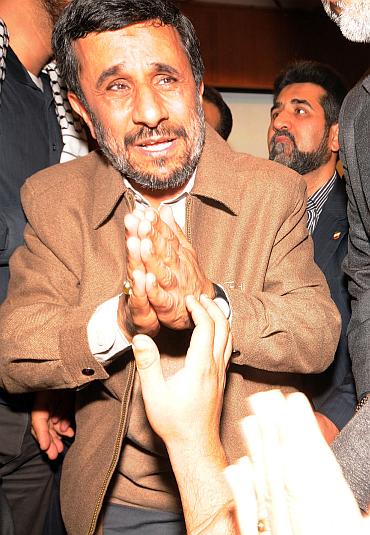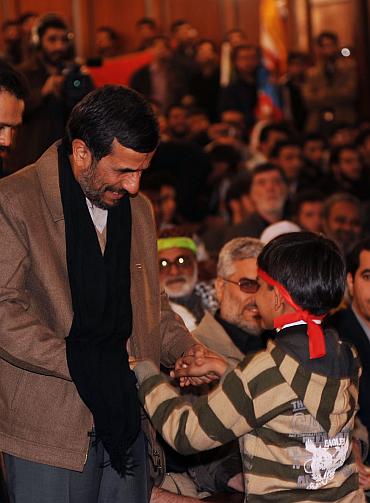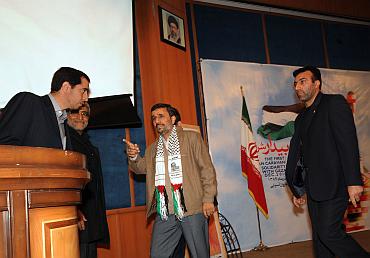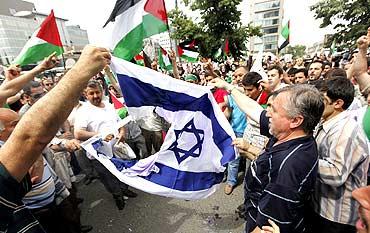 | « Back to article | Print this article |
Peace Caravan to Gaza gets rousing reception
The ship Salam carrying about $ 1m worth of humanitarian aid for Gaza accompanying the first Asia to Gaza Caravan has not being allowed to dock at the Al Arish port in Egypt.
8 members of the caravan, consisting of 4 Indians, Brigadier Sudhir Sawant, Ajit Sahi, Sheheen Kattiparambil, young activist of Jamat-e-Islami, Aslam Khan, student leader of All India Students Association - Koichi Sakaguchi from Japan, Hakim Alizade from Azerbaijan, Muhammad Husein from Indonesia and Norazli Bin Musa from Malaysia, are aboard the ship which left Latakia, Syria, on Saturday. The ship has been anchoring about 1 km away from the Al Arish port for about a day now.
Meanwhile over hundred members of the caravan have already reached Gaza after a 4 hour hold up at the Al Arish airport late evening on Sunday.
The caravan was apprehensive of interception by Israel, whose two ships and a helicopter followed the Salam for the entire day on Sunday. The stalling by Egypt has come as a surprise. This is the first time that aid for Gaza has being stalled by Egypt.
The Asia to Gaza caravan's amazing journey
The next day, at a meeting the Baath Party office bearer and former Ambassador to India, Dr Mohsen Alkhyyr, spoke fondly of the vision of Gandhi and role of Nehru in giving shape to the Non-Aligned Movement along with Nasser, Tito and Sukarno. It is interesting that the role of India which is appreciated by leaders of especially the third world countries is from the days of Gandhi and Nehru. People like to avoid mentioning the changing foreign policy of India under the recent regimes, abandoning the cause of non-alignment and trying to jump on the bandwagon of developed nations and military powers.
While awaiting the clerance from Egyptian authorities to enter Gaza, the caravan members were invited by a host of organizations - of students, farmers, workers and engineers. The caravan members also visited the Al-aa-Deen camp of Palestinian refugees, some of whom came as far back as in 1948. This camp is also host to Syrian refugees from Golan Heights and some Palestinian refugees from Iraq. Except for the right to citizenship, the earlier refugees enjoy all the benefits entitled to Syrian citizens. But the Palestinian refugees admit quite unambiguously that they are the guests of Syrian government. The day the situation will become normal they'll return to their homeland after handing over their property to the Syrian government.
The Syrian government also considers the Palestinian people as their own. The banner to welcome to caravan on behalf of Governor of Latakia read: 'The masses of the Governorate of Latakia Salute the Free Men of Convoy Asia (1) to Break the Siege of Our People in Gaza.'
The caravan members have been received warmly in the Arab world as they are seen as supporting an Arab cause.
The Egyptian government gave permission to 120 people to enter Gaza as opposed to the promise of an earlier figure of 100 but was quite clear that they would not allow any Iranian citizens, including 7 members of parliament - Mahmoud Ahmadi Biqash, Avaz Heidarpour, Parvi Sarvari, Ali Motahhari, Ali Asqar Zarei, Hassan Qafourifard and Shabib Jooyjari. They also denied permission to 6 Jordanian activists, who have taken strong positions earlier not palatable to the Egypt, Israel or US. This was not totally unexpected.
Egypt and Iran have strained ties for the last 30 years. Since the days, when Egypt gave asylum to Shah of Iran, Mohammad Reza Pahlavi, the Camp David Accord after the Egyptian recognition to Israel, support to Iraq in the Iran-Iraq war and in response Iran deciding to name a street after Khaled Islambouli, the assasin of Egyptian president Anwar Sadat, there have been no diplomatic relations between Egypt and Iran.
Lately, Iran's support to Hezbollah and Hamas is also a source of concern for Egypt. The first Asia to Gaza Solidarity Caravan faced a dilemma. How could some friends be left behind because of the whims of Egyptian government? But in the end the Iranian members prevailed over the group and convinced everybody that even they would be most happy only if the caravan reaches Gaza.
Nothing is more serious that the pain and suffering of people of Gaza, who were looking forward to the arrival of First Asia to Gaza Solidarity caravan. They could not be disappointed. Hence a decision was taken by consensus for the caravan to move ahead.
On 30th December the caravan members cheered the staff of Latakia Port as they loaded humanitarian aid - food, medicines, stationery for children and four ambulances - on the ship appropriately named 'Salam' or peace by raising pro-Palestine slogans.
Eight members of the caravan, Brigadier Sudhir Sawant, former MP, Ajit Sahi, senior journalist, Sheheen Kattiparambil, young activist of Jamat-e-Islami, Aslam Khan, student leader of AISA, all from India, Koichi Sakaguchi from Japan, Hakim Alizade from Azerbaijan, Muhammad Husein from Indonesia and Norazli Bin Musa from Malaysia were given the responsibility to accompany the ship to Al Arish port in Egypt.
On the new year's day of 2011 the ship sailed from the Latakia port amidst cheering by the remaining members of the caravan and Latakian citizens. The Governor of Latakia accompanied by the Baath Party chief was there on both ocassions, when the loading was taking place as well as when it sailed. The send off became quite emotional as there was a realization that Israelis may intercept the ship in mid water. Ajit Sahi speaking before the ship's departure said that in case of any mishappening, this caravan to Gaza must not stop and there should be more such caravans. Quoting Mahatma Gandhi he said bravery is not in killing people but in sacrificing one's life fighting against injustice. It is amazing how Gandhi has become relevant for the Asia to Gaza caravan. Historically, he had disapproved of the creation of Israel and said Palestine belongs to the Arabs in the same sense that England belongs to the English and France to the French.
The flags of India, Pakistan, Iran, Turkey, Syria, Japan, Indonesia, Malaysia, Azerbaijan and Palestine were waved by caravan members on board as the ship left the shores of Latakia.
The Asia to Gaza caravan's amazing journey
Like all meetings in Turkey, the one in Gaziantep was also organized in a sports complex. A student of Jamia Millia Islamia of New Delhi, Aslam Khan, said in his speech that supporting the cause of Palestine is important because success here will mean a setback to the march of imperialism globally.
The members of caravan were promised that they would be given Syrian visa on arrival. The process was smooth. The visa fees for 81 members from 9 countries was waived. The members waited in their buses as exit stamp was placed on their passports on Turkey side and visa was issued on the Syrian side at Eajaz. They changed into waiting buses from hosts in Syria. The Governor of Alappo province, Ali Ahmed Mansoora, was there to receive the caravan at the border. Five roadside receptions, including at Edlip and Homs, were given on the way to Damascus by people who came out with Syrian and Palestinian flags and hand written placards.
The Red Crescent of Iran donated US $ 7,00,000 worth of medicines to be sent with the caravan. With the money donated for ambulances and medical-surgical equipments by the Iranian parliament the total contribution from Iran alone as aid to Gaza has reached US $ 1 million now.
Charitable Association for Palestinian Relief hosted a meeting for the caravan on 21st December in Damascus. Ahmad Abdul Karim, on behalf of this organization as well as a member of Baath Party in Syria, assured his full support to the Asian caravan. Palestinian leaders Ramzam Abdullah of Islamic Jihad Movement in Palestine and Ahmad Jibril Abu Jehad also spoke on the ocassion.
Another high point of the caravan was meeting on 22nd December in Damascus which was addressed by Khalid Meshal, head of the Political Affairs of Hamas, the group in power in Gaza. Khalid Meshal paid his tributes to Mahatma Gandhi for his inspiring struggle against the colonialism. He thanked the caravan, especially the two families - an Indian and a Pakistani - who were accompanying it as well as the families of caravan members who couldn't come for their support. He said he was happy to receive the caravan in Damascus and hoped that one day he will receive them in liberated Gaza and finally in liberated Palestine at Jerusalem.
Khalid Meshal made is clear that Palestinians are fighting for a real state without any occupation and with Jerusalem as its capital. All mosques and churches, including the Al Aqsa mosque, will be free in this Palestine and Jews, Muslims and Christians will live together as equal citizens.
At the end of the meeting the Indian organizer Feroze Mithiborwala presented Meshal with a copy of Mahatma Gandhi's autobiography.
In an interview later in response to a question on Indian government's changing stand vis-a-vis Israel he said India, as an ancient civilisation, has had a traditional relationship with Arab world and it too had to fight against the imperialist power, hence it would do well to reflect on its position. In reponse to another question as to why, unlike Yasser Arafat, he was not reaching out to the world and especially to India, Khalid Meshal said he would be happy to come to India if invited. It is noteworhty that Brazil had recognized Palestine as a state just the previous day.
In the evening the caravan members were invited by Khaled Abed Al-Majeed, General Secretary of the Palestinian Popular Struggle Front, to visit the refugees in Yarmouk camp where close to one lakh people live. Damascus is home to about 5 to 6 lakhs Palestinian refugees.
On 23rd December, some members of the caravan were invited to Beirut where they met the former Prime Minister of Lebanon and now the President of International Committee to Break the Siege of Gaza, Dr. Salim Hoss. In an informal chat, at his apartment on the 6th floor of a building in the heart of city, he said one should be prepared for the worst from Israel which commits barbaric acts in the name of self defence whereas it is actually the Arab nations which have to worry about their self defence against Israel. He admitted that Lebanon has been the victim of Israeli aggression often but lately because of facing stiff resistance Israel has become careful. He said that Palestinian refugees in Lebanon, numbering about 50,000 were quite well behaved even though the Lebanese government was not able to take complete care of them.
Former member of parliament, Osman Saad, welcomed the caravan in Saida, capital of South Lebanon, the next day after which it was taken to the hilltop war museum at Mleeta, centre of valliant resistance against the Israeli occupation of Lebanon. Beginning with the first attack on Lebanon in 1975, Beirut was invaded in 1982, the second Arab capital to fall to Israel after Jerusalem in 1948. It tool 15 years of struggle before Israel partially withdrew from Saida and villages surrounding Mleeta in 2000 before its conclusive defeat in 2006. While the South Lebanon Army was fighting along with the Israeli forces it was Hizbullah which emerged as the saviour of Lebanese society.
The caravan which has now grown to 164 members - 60 from India, 32 from Jordan, 20 from Iran, 13 from Indonesia, 10 from Lebanon, 9 from Pakistan, 6 from Turkey, 4 from Bahrain, 3 from Malaysia, 2 each from Japan and Bangladesh and 1 each from Syria, Azerbaijan and Tajikistan - is now awaiting the clearance from Egyptian authorities to leave the shores of Syria to sail to Egypt before its final entry into Gaza.
The Asia to Gaza caravan's amazing journey
Upon reaching Tibriz and two days before crossing over into Turkey the caravan was greeted by the morale boosting news that seven members of parliament of Iran have decided to join the caravan to Gaza.
The second largest contingent, after India, of 13 members in this caravan is from Indonesia. Irman Abdurehman from this group informed the audience at the meeting in Tibriz that a voluntary organization Mer-C is planning to build a 100 bed trauma centre and rehabilitation hospital in Gaza. Immediately after the 22-day brutal attack started on Gaza two years ago, in which 1,366 people, half of whom were women, children and elderly, died, a team from Indonesia set off for Gaza on 1st January, 2009, and signed a MoU with the Palestinian health minister to set up this hospital there.
The Palestinian government provided the land for this purpose and the Indonesian government backed this effort by readily agreeing to contribute US $ 1 million, towards construction of a hospital. The Indonesians have decided to have a long term association with the people of Gaza and share their suffering by continuing to serve them.
Bazargaan was the last stop-over inside Iran before the caravan moved into Turkey. Insani Yardim Vakfi or IHH was the host organization here which is a big Islamic charity operating in 125 countries. More importantly, it was IHH which had organized the aid flotilla to Gaza which was attacked by Israel on 31 May, 2010, in which 9 people, Ibrahim Bilgen, Ali Haydar Bengi, Cengiz Songur, Cengiz Akyuz, Cevdet Kiliclar, Getin Topcuoglu, Fahri Yildiz, Furkan Dogan and Necdet Yildirim died and Ugur Suleyman Sonmez, is still in coma.
This single incident has changed the equation between Israel and Turkey. There is attempt by Israel and US to label IHH as a terrorist organization and IHH is taking legal action against Israel in order to identify the war criminals and prosecute them.
The caravan was taken to its first stop Van in the form of a convoy of vehicles. Several roadside receptions were organized on the way. In the public meeting held in a sports complex a speaker from the each of the countries represented in caravan Bahrain, Indonesia, Malaysia, Azerbaijan, Iran, Pakistan, Japan and India spoke. Advocate Gulden Sonmez and her colleague Nalan Dal who coordinated the meeting on behalf of IHH were both present on the ship Mavi Marmara, among the approximately 560 passengers, which bore the brunt of the Israeli attack on flotilla. Among other members present on the ship and who attended the meeting on 17th December, 2010, at Van were Abdulhalim Almali, Mehmet Gaken, Selahattin Ozer, Muhlis, Abdullah Camioglu, all from Turkey, and journalist Quassima Ibn Salah, of Moroccan origin.
Later, Gulden Sonmez shared with the caravan the preparations for the forthcoming event on 26th December, 2010, when the ship Mavi Marmara, having been released by Israel and repaired, except for the marks of attack, will return to Istanbul.
Israeli Prime Minister Banjamin Netanyahu has refused to apologize for the attack or pay compensation to the families of the deceased and injured. After the UNHRC came up with a report indicting Israel on the attack, a four-member committee has been set up by the UN Secretary General with the objective of mediating between Israel and Turkey.
The next stop-over for the caravan was Diyarbakir, The convoy had grown to about hundred vehicles on its second day in Turkey. In Diyarbakir police refused permission to hold an indoor meeting. People carrying placards with slogans in support of Gaza and Palestine had lined the streets. Hundreds of pigeons, symbols of peace, were released as a mark of commitment of the movement to liberate Gaza and Palestine.The route of the caravan passed through the Kurdish areas of Turkey, where there is a simmering movement for autonomy. The IHH wanted to convey to the people that as the caravan composed of people of different religious and ethnic backgrounds, Turks and Kurds needed to live together in harmony.
In fact, after the attack on Mavi Marmara people with different shades of opinions in Turkey have come together on the question of ending the siege of Gaza. As Yildirim mentioned in a press conference later, anybobdy who had a soft corner for Israel was disillusioned now.
Common people who came to public events of the caravan in Turkey wanted their pictures to be taken with the caravan members to express their emotions of solidarity. They warmly shook hands and hugged the visitors. The caravan has been able to provide a channel to the people's sentiments. Like in Iran, men, women and children came out on streets to support the caravan and send their greetings to Gaza.



